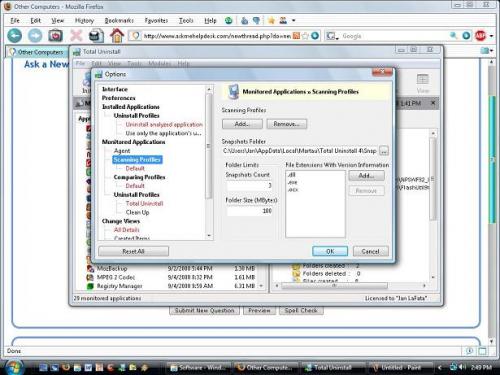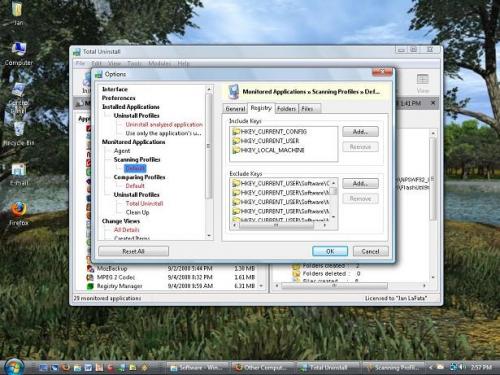After that I go into to regedit in Vista and do a text search for remnants of the program I just uninstalled. I usually find plenty that I can delete. I do not touch the binary information that comes up after I do a search because I don't know what all the numbers mean or if I should delete them or not.
Also I have two other registry edit utilities that I run, that scan a little deeper than regedit. I delete what I can from them also. So after all of that I am usually content that I got rid of most of the leftovers from any given program that was uninstalled, however deep inside, I still wish there was a better way to go about it all.
Enter the program Total Uninstaller. I bumped into it on the web and immediately bought it. I liked the way it described the method it used to get as clean an uninstall as possible. The way it works is, when you want to install a program, you install it under "monitored installations. It first takes a snapshot of your registry and system files, then you install your program, then it takes a final snapshot.
That, in theory, is supposed to result in a more thorough and cleaner uninstall, leaving fewer remnants in the registry than other uninstall programs. So lately I've been busy installing programs left and right because I just reformatted, however the other day I uninstalled my first program using Total Uninstaller and I was confident it would do a very thorough job
However after the uninstall, I was curious as to how efficient the program was, so I ran one of my registry edit utilities and up came about 40 to 50 entries related to the program I just uninstalled. Boy was I surprised. And a little angry.
I immediately contacted Gavrila Martau., the developer behind Total Uninstaller. I asked him why, when his web page makes claims of a complete uninstall, I still find remnants in the registry. His reply was "By default, Total Uninstall doesn't scan some of the registry locations that are not important. It is about "Most recent used" lists that are handled by Windows. In these keys the registry values are replaced by others as you use another programs (older entries are replaced by new items). So even if these entries are deleted will be soon populated by Windows with entries of other programs"
You can tell his English is not that great, but I still was not satisfied with his answer, so I wrote him back. But before I did, I opened up his options menu and looked for Scanning Profile Options (see attached screenshot). I saw "File extensions with version information" with a white box under it and a box that says "Add". That looked like a place where you could add types of file extensions in order to make for a more thorough snapshot, thereby resulting in a cleaner uninstall.
The current extensions that were in there were .dll, exe and .ocx. So I asked him what other extensions could I add? His answer was "As long as the file version is not part of the system snapshot the list is not used. The version information take a lot of time if you activate it in the scanning profile " I didn't totally understand the answer, so I moved on.
I then asked him about "Monitored Applications, Scanning Profiles, Default and Registry". (see screenshot) There is an"add" button and I noticed that in the box are currently only three, I think you call them "hives". Excluded are HKEY_Users and HKEY_Current_Config. I asked him could I add those to make for a more thorough scan, monitored snapshot, install, snapshot, then uninstall?
His reply " Yes, you can add them. But you should know that HKEY_Users include HKEY_CURRENT_USER and the HKEY_LOCAL_MACHINE include HKEY_Current_Config.
I went on a little further about getting Total Uninstaller to run to it's optimum potential, but I didn't understand a whole lot more of what he was talking about. I did ask him one more question related to MRU registry entries that are leftover after an uninstall and he just said "These registry entries doesn't accumulate but are recycled."
But I think he is not telling the truth here. During my post-uninstall scan, the entries that I found were not MRU entries. I don't know what they were but they were definitely not MRU entries.
Finally I just asked him if I should just not worry about tweaking Total Uninstaller and he said "Just use Total Uninstall and a non aggresive cleaner like CCleaner"
So that's where I stand. While I don't think I was totally taken, I did buy a program that does not do everything it says. And I should have tried out the trial version first and given it a test drive before I bought it. So that's why I am so interested in seeing if I can tweak the program a little more to be more aggressive, but from what everything the developer tried to say, the program is already as tweaked as it can be.
That's where I need your expert advice. It still seems to me that more could be done to it, but the developer is hard to understand and doesn't explain things that well, so I really don't know how. All I know is that I'm still frustrated that all of these uninstaller program still leave many many remnants. Remnants of which I still have to go into the registry and delete manually.
By the way, if you wanted to you could download the trial program and follow me along to see if what I've said is true and tell me if the program's functionality can be improved
upon through the options menu. The URL is: http://www.martau.com/
I look forward to hearing your suggestions
Jan LaFata


















 Sign In
Sign In Create Account
Create Account

